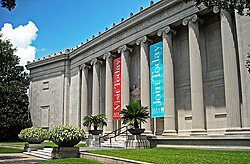Museum of Fine Arts (Houston)

Watkin Building
|
|
| Established | 1900 |
|---|---|
| Location | 1001 Bissonnet Houston, TX 77005 United States |
| Coordinates | 29°43′32.5″N 95°23′25.5″W / 29.725694°N 95.390417°WCoordinates: 29°43′32.5″N 95°23′25.5″W / 29.725694°N 95.390417°W |
| Type | Art Museum, Institute, Library, Sculpture Park |
| Director | Gwendolyn H. Goffe (interim) |
| Public transit access | Museum District |
| Website | www |
The Museum of Fine Arts, Houston (MFAH), located in the Houston Museum District, Houston, is one of the largest museums in the United States. The permanent collection of the museum spans more than 6,000 years of history with approximately 64,000 works from six continents.
The museum benefits the Houston community through programs, publications and media presentations. Each year, 1.25 million people benefit from museum's programs, workshops and resource centers. Of that total, more than 500,000 people participate in the community outreach programs.
The MFAH's permanent collection totals 63,718 pieces in 270,000 square feet (25,000 m2) of exhibition space, placing it among the larger art museums in the United States. The museum's collections and programs are housed in seven facilities. The main buildings (Law and Beck) have 130,000 square feet (12,000 m2) of exhibition space.
The school offers classes at the Studio School for Adults and the Glassell Junior School, as well as Community Bridge Programs, special programs for youths, and the Core Artist-in-Residence Program.
The Museum of Fine Arts, Houston (MFAH) is the oldest art museum in Texas. In 1917, the museum site was dedicated by the Houston Public School Art League (later the Houston Art League) with the intention of becoming a public art museum. The first museum building – opened to the public in 1924 – represented the determination of Houstonians to transform their growing city into a rich cultural center. Trustees and staff dedicated the small art collection to the community and defined the function of the museum as bringing “art into the everyday life” of all Houstonians. Today the MFAH encompasses two buildings, the Caroline Wiess Law and Audrey Jones Beck buildings, that house its primary collections and temporary exhibitions; two decorative arts house museums; The Glassell studio art school; a sculpture garden; a state-of-the-art facility for conservation, storage and archives; and an administrative building with the Glassell Junior school of Art
Prior to the opening of the permanent museum building in 1924, George M. Dickson bequeathed to the collection its first important American and European oil paintings. In the 1930s, Houstonian Annette Finnigan began her donation of antiquities and Texas philanthropist Ima Hogg gave her collection of avant-garde European prints and drawings. Ima Hogg’s gift was followed by the subsequent donations of her Southwest Native American and Frederic Remington collections during the 1940s. The same decade witnessed the 1944 bequest of eighty-three Renaissance paintings, sculptures and works on paper from renowned New York collectors Edith and Percy Straus. Over the next two decades, gifts from prominent Houston families and foundations concentrated on European art from the fifteenth to twentieth centuries, contemporary painting and sculpture, and African, Oceanic and Pre-Columbian art. Among these are the gifts of Life Trustees Sarah Campbell Blaffer, Dominique de Menil and Alice N. Hanzsen as well as that of the Samuel H. Kress Foundation. Augmented by museum purchases, the permanent collection numbered 12,000 objects by 1970.
...
Wikipedia
